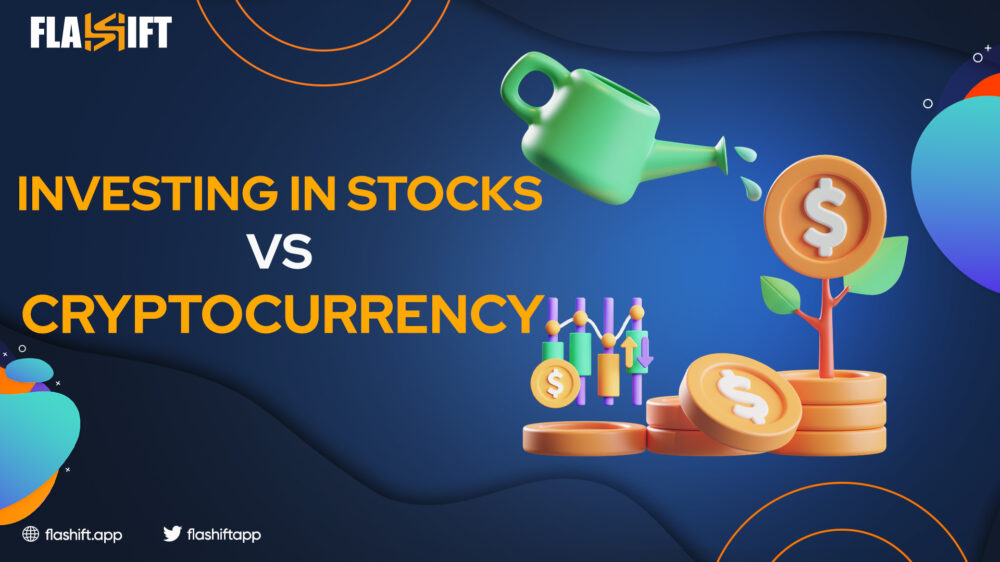Stocks, additionally referred to as a share, denotes the ownership of a portion of a corporation. In many circumstances, the stockholder gets to keep a portion of the company’s profits in the form of a bonus. Stock markets, such as the New York Stock Exchange, are principally where stocks are sold and purchased, or “traded.”
Stocks have always been a tempting investment for many investors—when a business does effectively, so do the individuals who made investments in it. If the worth of their investment rises, they will be able to sell it at an advantage. Of course, corporations do not always perform well, so investors face the danger that their investment may lose value.
Read more: What is Cryptocurrency?
What Is Stock Market?
The stock market is the place where the shares of publicly traded companies are sold and bought. It’s an important factor in the whole world economy because it allows companies to raise capital through the issuance of their shares to the general public and provides investors with very good opportunities to buy ownership stakes in companies, with potential profits. Exchanges are where the supply and demand for stocks are matched, and prices are determined. The two most famous exchanges are the New York Stock Exchange-or the NYSE-and Nasdaq.
Investors in the company buy shares, otherwise known as stock, in that company. They, therefore, become the owners of part of that company. When the business is doing well, because the stock rises in value, it enables investors to sell the stock at higher prices and give them profit. Moreover, some companies pay dividends, thus providing regular income to shareholders. Conversely, if the company’s performance is poor, then the stock will probably lose value and decrease in worth.
Supply and demand rule in the stock market: In pricing stocks, besides the economic situations, sentiment of the market, and geopolitical events, the financial condition of the company is considered. Stock prices generally tend to change due to active buying and selling decisions throughout the day.
There are two major types of stock markets:
1. Primary Market: It is a market wherein the firms issue new shares through Initial Public Offers and place them in the market for raising capital.
2. Secondary Market: After issuance, these shares can be traded amongst investors through stock exchanges. The largest bulk of activities relating to the stock markets takes place here.
Stock market investment provides a good potential for growing your resources but it also carries a number of risks related to the fluctuations of the prices and instability of the market. Typically, only those who successfully work in the stock market have some research and market knowledge, besides a well-considered approach.

Stocks vs cryptocurrency; what they have and don’t have in common.
- Exchange
Stocks undergo trading on recognized exchanges all around the world. They provide stock purchasers with safety, stability, and accessibility, and are designed to manage high trading volumes on a daily basis. Trades are carefully regulated (though specifics vary by region), offering both buyers and sellers with security.
Markets for buying and selling cryptocurrencies are very new. Binance and Coinbase are two of the greatest. Certain exchanges collaborate with third companies to facilitate the conversion of traditional currencies, such as the US dollar, for cryptocurrency.
Read More: Two sides of investing in cryptocurrency
- Function
When it comes to exchanging value, numerous cryptocurrencies were built as operational cryptocurrencies, meaning they are intended to function as a type of digital money or coin.
When a person buys a stock, they are purchasing a fractional control part in the issuing corporation. When a person buys a digital currency, they are not automatically purchasing a fractional ownership of the blockchain; rather, they are purchasing a means of exchange.
- Technology
The blockchain system that supports every digital currency is the final and most fundamental distinction between equities and cryptocurrencies. Many cryptocurrencies enable the addition of development, transforming the crypto asset into “programmable cash.”
Other instances of use, such as smart contract development and other DeFi purposes, such as Dapps (decentralized applications), may be created on top of particular cryptocurrencies. Stocks may only be used for capital growth, regular cash flow, and voting privileges.
- Frauds and security hazards
Cryptocurrency marketplaces are expanding and growing at a quick speed, which, paired with their mostly unregulated character, makes them a breeding ground for various types of frauds. These scams sometimes involve attempts to get private data from individuals, including the keys necessary to access an individual’s crypto investments, or efforts to make investors send cryptocurrency to scam artists who may be impersonating legal companies. Stocks are not safe toward cybersecurity hazards either.

- Strategic additions
There are some parallels and significant distinctions between cryptocurrency and equities. Investment experts who understand their respective strengths and limitations might utilize them in a single portfolio for multiple purposes:
- Stocks offer security. For the majority of the twentieth century and into the twenty-first, they were the go-to investment to develop wealth for people and businesses.
- The more volatile choice is cryptocurrency. It provides the opportunity for large gains, but at a higher risk.
Conclusion
Therefore, is cryptocurrency superior to stocks? No, not always. You might consider investing in both, based on your level of risk capacity. Introducing cryptocurrency to your holdings in stocks can be a fantastic way to add some beneficial diversity while also opening the door to potential profitable returns—all while being fully exposed to the hazards of either investment. Take a look at the notes below before any investing:
- What is the most you are able to lose? A well-diversified stock portfolio may provide a more solid home for your cash than crypto assets.
- How much do you hope to earn? Stocks can provide more consistent profits, while cryptocurrency might possibly provide bigger increases.
- What is your timetable? Cryptocurrency price swings can let you gain money far faster than the stock market’s longer time horizons, but they can also lead to large short-term losses.






